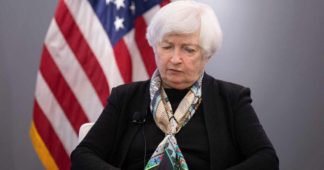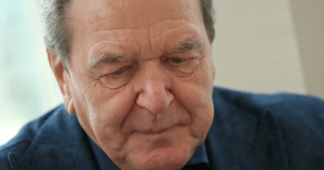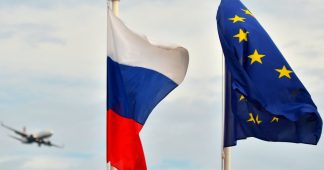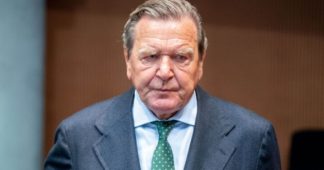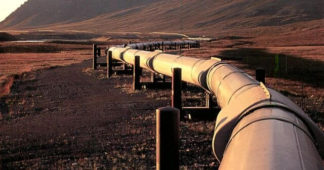Even the staunchest transatlanticists might finally be realising that Europe has shot itself in the foot when it comes to energy supplies
Brussels is reportedly considering a return to Russian gas as part of a peace agreement for Ukraine. Is common sense finally returning to European politics? Guest post by Maike Gosch, originally published in the German magazine NachDenkSeiten.
By Thomas Fazi
Feb 2, 2025
I was astonished to read the following information in the Financial Times the other day:
European officials are debating whether Russian pipeline gas sales to the EU should be restarted as part of a potential settlement to end the war against Ukraine, according to people familiar with discussions.
As a German reader, one might think, “Wow, those are some new tones coming from our beloved capital of hearts, Brussels”.
The article continues:
Advocates of buying Russian gas argue it would bring down high energy prices in Europe, encourage Moscow to the negotiating table, and give both sides a reason to implement and maintain a ceasefire.
Has common sense finally made its way to Brussels? One had almost given up hope. But who exactly are these officials? Fortunately, the article provides more details:
Three of the officials briefed on the talks said the idea had been endorsed by some German and Hungarian officials, with support from other capitals that saw it as a way to reduce European energy costs.
“There is pressure from some big member states on energy prices and this is one way to bring those down, of course”, said one official.
Given how much the AfD and later the BSW in Germany were vilified by the press and political competitors as “Putin stooges” for essentially holding the same position, one can’t help but rub their eyes in disbelief.
After all, one of the very reasons the Nord Stream project was initiated in the early 2000s under former chancellor Gerhard Schröder and Russian president Putin was to facilitate gas trade between the two countries for their mutual economic benefit — and to secure peace through close and systemically relevant economic ties. And now, suddenly, it’s a good idea again?
Of course, one might argue that it’s a rather adventurous negotiation tactic to “lure the enemy” — Russia — to the “negotiating table” with the offer to supply Europe with cheap natural gas. It’s hard to say whether this is truly the bait strategists are hoping for. But naturally, Russia has also suffered losses due to the obstacles the EU and Ukraine have placed in the way of gas deliveries — most recently through Ukraine’s non-renewal of the transit agreement for Russian gas, effectively shutting down the last major export route to the EU.
Even more interesting, however, is a surprisingly candid explanation from mainstream Western media about who would be particularly harmed by such a resumption of direct gas supplies:
The revival of the debate on gas sales has unsettled some US LNG exporters seeking to sign long-term supply deals with European companies. They fear that any restart of Ukrainian transit could make their products uncompetitive, according to two of the officials.
So, was it about this all along? We certainly wouldn’t want European countries to have a cheaper alternative, potentially freeing them from the obligation to buy overpriced US gas. But don’t worry — our unelected EU officials are already on it:
One of the European Commission’s top energy officials Ditte Juul Jørgensen is in the US meeting LNG exporters this week, for talks that will touch on long-term potential supplies.
We then learn in the next paragraph:
The EU’s stated target is to rid the bloc’s energy system of all Russian fossil fuels by 2027. The EU’s energy commissioner Dan Jørgensen is due to present a plan for hitting that goal in March.
Good to know. This highlights the risk of shifting such vital decisions away from German voters to the EU level. While a heated debate is ongoing in Germany about resuming affordable Russian gas imports, the EU is quietly making concrete commitments. One should perhaps be grateful that this time it isn’t being negotiated via secret text messages.
What’s going on?
Why is Brussels now (finally) proposing to resume Russian gas imports — even if only in the background? I’ll attempt an “analysis,” as mainstream media journalists like to say nowadays.
Trump is preparing peace negotiations with Russia, as he promised before the election. Since the battlefield situation is not going well for Ukraine/NATO, pressure must be exerted in other ways. This includes tightening sanctions, increasing pressure on Russia’s partners China and India not to buy its oil, launching drone attacks deep into Russian territory targeting energy infrastructure and nuclear power plants, stopping energy transit, and even threatening to acquire Nord Stream.
How the Russian government will react and whether this will prove to be a successful tactic remains to be seen. Rumors suggest that a peace settlement is planned for the symbolic date of May 9, 2025.
The EU plays little role in these peace negotiations beyond maintaining pressure on Russia through sanctions (and, of course, financial and military support for Ukraine). The peace agreement is expected to be negotiated between the Russian and US governments. President Putin recently stated that he would not negotiate with Ukrainian president Zelenskyy, as he considers him illegitimate following the expiration of his term.
And now, it seems that some senior EU officials are beginning to contemplate the impending “threat of peace” (as ZDF expert Elmar Theveßen aptly put it) and the post-war period.
Even the staunchest transatlanticists might finally be realising that Europe has shot itself in the foot when it comes to energy supplies, and that, after a peace deal, the EU could find itself stuck with long-term, exploitative contracts that force it to continue purchasing large quantities of overpriced LNG from the US — even after the “moral argument” (“Germans, do not buy from the brutal Russian aggressor!”) loses its effectiveness.
Before anyone accuses me of cynicism, let me clarify that I have always considered this moral justification to be a pretext. While it was undoubtedly believed by many, especially the idealistic Greens, I have always viewed it as a cleverly constructed propaganda and manipulation strategy.
It is, therefore, entirely appropriate to seriously reconsider whether prioritising strong economic ties and peace with our own neighbors is the smarter choice — ideally before the German economy collapses further and drags the EU economy down with it.
We remind our readers that publication of articles on our site does not mean that we agree with what is written. Our policy is to publish anything which we consider of interest, so as to assist our readers in forming their opinions. Sometimes we even publish articles with which we totally disagree, since we believe it is important for our readers to be informed on as wide a spectrum of views as possible.
